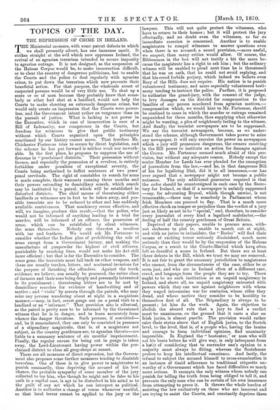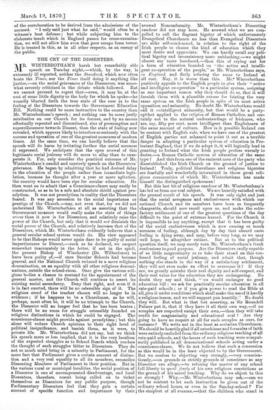TOPICS OF THE DAY.
THE REPRESSION OF cRTArm ra IRELAND. THE Ministerial measure, with some patent defects to which we shall presently advert, has one immense merit. It strikes straight at the evil which now oppresses Ireland, the revival of an agrarian terrorism intended to secure impunity to agrarian outrage. It is not designed, as the suspension of the Habeas Corpus would be, to make insurrection difficult, or to clear the country of dangerous politicians, but to enable the Courts and the police to deal regularly with agrarian crime, to put down the terrorism which now prevents their beneficial action. For that purpose, the wholesale arrest of suspected persons would be of very little use. To shut up a score or so of men because they probably knew that some- body or other had shot at a landlord, would not help the Courts to make shooting an extremely dangerous crime, but would only create an impression that the Courts were power- less, and the Government intent rather on vengeance than on the pursuit of justice. What is lacking is not power in the Executive, which in case of insurrection is sure of a Bill of Indemnity, nor competence in the Courts, but freedom for witnesses to give that public testimony without which Courts organized upon the principles sanctioned by our history cannot move. That freedom Mr. Chichester Fortescue tries to secure by direct legislation, and the scheme he has pat forward is neither weak nor unwork- able. In the first place, he proposes to suppress the use of firearms in "proclaimed districts." Their possession without licence, and especially the possession of a revolver, is entirely forbidden under penalties of exceptional severity, the Courts being authorized to inflict sentences of two years' penal servitude. The right of constables to search for arms is made complete, their warrants running three months and their powers extending to domiciliary search, which search may be instituted by a patrol, which will be established in disturbed districts. The chief means of threatening either landlords or witnesses are in fact to be taken away, and pos- sible terrorists are to be reduced to other and less suddenly available contrivances. That machinery seems effective, and will, we imagine, produce this result,—that the police, who would not be informed of anything leading to a trial for murder, will be informed of an offence, the possession of arms, which can be established by silent witnesses, the arms themselves. Nobody can threaten a revolver with tar and feathers. We would ask Mr. Fortescue to consider whether the Indian plan of prohibiting the sale of arms except from a Government factory, and making the manufacture of gunpowder the highest of civil offences, punishable by crushing fines, would not make his Act still more efficient ; but that is for the Executive to consider. The arms gone, the terrorists must fall back on other weapons, and these are usually torches, letters, and nocturnal invasions for the purpose of thrashing the offenders. Against the torch evidence, we believe, can usually be procured, the entire class of farmers and their sons being deeply and personally interested in its punishment ; threatening letters are to be met by domiciliary searches for evidence of handwriting and of motive ; and "visits" by arrests through the patrols, who may seize any persons wandering about at night in a suspicious manner,—may, in fact, arrest gangs out on a penal visit to a landlord or an "informer." That provision also is effectual, as the patrol is pretty sure to be informed by the threatened witness that he is in danger, and to learn accurately from whence the danger threatens. Such persons, if convicted— and, be it remembered, they can only be convicted in presence of a stipendiary magistrate, that is, of a magistrate not subject, as the country gentlemen are, to agrarian threats—are liable to a summary sentence of six months' imprisonment. Finally, the regular excuse for being out in gangs is taken away, the Lord-Lieutenant having power within the pro- claimed district to close all grog-shops at sunset.
These are all measures of direct repression, but the Govern- ment also proposes some further measures tending to diminish terrorism. One of these is to give power to magistrates to punish summarily, thus depriving the accused of his best chance, the probable sympathy of some member of the jury collected to try him, who though he might not be false to his oath in .a capital case, is apt to be disturbed in his mind as to the guilt of any act which he can interpret as political. Another is to authorize a change of venue whenever needful, so that local terror cannot be applied to the jury or the lawyers. This will not quite protect the witnesses, who have to return to their homes ; but it will protect the jury effectually, and no doubt even the witnesses, so far as immediate coercion is concerned. Another is to enable magistrates to compel witnesses to answer questions even when there is no accused, a sound provision,—more useful, we suspect, than many critics would allow. Of course, the Ribbonman in the box will not testify a bit the more be- cause the magistrate has a right to ask him ; but the ordinary witness will be enabled to plead next time he is threatened that he was on oath, that he could not avoid replying, and that his creed forbids perjury, which indeed we believe even Rory of the Hills does not require. His notion is to punish volunteered testimony, and more especially volunteered testi- mony tending to instruct the police. Further, it is proposed to authorize the grand-jury, with the consent of the judge, to levy damages on the district for compensation to the families of any person murdered from agrarian motives,— compensation which, we would hint to Mr. Fortescue, should be confined to cases in which the murder or outrage remained unpunished for three months, thus supplying what otherwise might be wanting, a plea of neighbourly feeling to the witness. And finally, the terrorist newspapers are to be suppressed. We say the terrorist newspapers, because, as we under- stand the scheme, although Government takes power to seize any newspaper, it will only exercise the power on newspapers. which a jury will pronounce dangerous, the owners receiving in the Bill power to institute an action for damages against the Crown. Mr. Fortescue seemed much afraid of this pro- vision, but without any adequate reason. Nobody except the senior Member for Leeds has ever pleaded for the exemption of journalists from the law,—and he, in that dangerous Bill of his for legalizing libel, did it in all innocence,—or has ever argued that a newspaper might not become a public nuisance. The only additional guarantee required is that the order should be countersigned in each case by the Secre- tary for Ireland, so that if a newspaper is unfairly suppressed —say, for advocating Repeal, which though unwise, is not treasonable,—there may be somebody in Parliament whom Irish Members can proceed to flay. That is a much more effective check on temper or prejudice than the verdict of a jury just as likely as not to be "special," and, therefore, to consider every journalist of every kind a legalized malefactor,—the feeling of half the country gentlemen of Great Britain.
Deprived of their papers, unable to procure arms, with- out shebeens to plot in, unable to march out at night, and with no juries to intimidate, the"Bones" will find their means of exciting terror seriously diminished, much more seriously than they would be by the suspension of the Habeas Corpus, or a resort to the Courts-Martial which hang often, left so dreadful a name in Ireland. But there are at least three defects in the Bill, which we trust we may see removed_ It is not fair to grant the summary jurisdiction to magistrates who cannot, from the circumstances of the case, either be or seem just, and who are in Ireland often of a different race, creed, and language from the people they are to try. There ought to be no such institution as an unpaid magistracy in Ireland, and above all, no unpaid magistracy entrusted with powers which they can use against neighbours with whom they waged internecine war for centuries, whose rifles they dread, and whose motive they consider to be hostility to themselves first of all. The Stipendiary is always to be present; let him do the work. Again, the objection to abolish the absurd rule that a jury to find a verdict must be unanimous, on the ground that it casts a slur on Irish juries, is almost puerile. The provision would rather raise their status above that of English juries, to the Scotch level, to the level, that is, of a people who, having the brains and courage to form individual opinions, find unanimity impossible. In England the " booteater," or man who will eat his boots before he will give way, is only infrequent from a hatit of considering that to surrender one's opinion to a majority must always be fitting, whereas the Scotchman prefers to keep his intellectual conscience. And lastly, the refusal to subject the accused himself to cross-examination is an instance of timid adherence to traditional etiquette un- worthy of a Government which has faced difficulties so muc4 more serious. It exempts the only witness whom nobody can punish for telling the truth from being obliged to tell it, and prevents the only man who can be certain of his own innocence from attempting to prove it. It throws the whole burden of assisting the law exclusively on those who are innocent and are trying to assist the Courts, and constantly deprives them of the corroboration to be derived from the admissions of the accused. "I only said just what he said," would often be a witness's best defence ; but while subjecting him to the elaborate insult which in England passes for cross-examina- tion, we will not allow him even that poor escape from terror. He is treated in this, as in all other respects, as an enemy of the public.









































 Previous page
Previous page